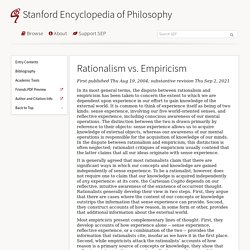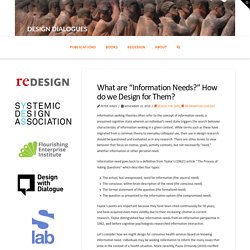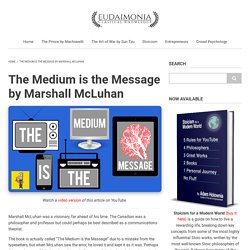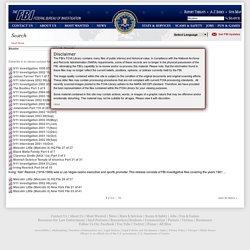

Hijabi Librarians – We've Got It Covered. Why you should re-read Paradise Lost - BBC Culture. Rationalism vs. Empiricism. 1.

Introduction The dispute between rationalism and empiricism takes place within epistemology, the branch of philosophy devoted to studying the nature, sources and limits of knowledge. The defining questions of epistemology include the following. What is the nature of propositional knowledge, knowledge that a particular proposition about the world is true? To know a proposition, we must believe it and it must be true, but something more is required, something that distinguishes knowledge from a lucky guess. The disagreement between rationalists and empiricists primarily concerns the second question, regarding the sources of our concepts and knowledge. 1.1 Rationalism To be a rationalist is to adopt at least one of three claims. The Intuition/Deduction Thesis: Some propositions in a particular subject area, S, are knowable by us by intuition alone; still others are knowable by being deduced from intuited propositions. Intuition is a form of rational insight. 1.2 Empiricism 2. 3. 4.
A Starting Point. NEA National Heritage Fellows: Map. Artificial Intelligence in education. P-TECH schools provide experience in growing fields. What are “Information Needs?” How do we Design for Them? Information seeking theories often refer to the concept of information needs, a presumed cognitive state wherein an individual’s need state triggers the search behavior characteristic of information seeking in a given context.

While terms such as these have migrated from a common theory to everyday colloquial use, their use in design research should be questioned and evaluated as in any research. There are other lenses to view behavior that focus on motive, goals, activity contexts, but not necessarily “need,” whether information or other personal need. Information need goes back to a definition from Taylor’s (1962!) Article “The Process of Asking Questions” which describes four types: The actual, but unexpressed, need for information (the visceral need)The conscious, within-brain description of the need (the conscious need)The formal statement of the question (the formalized need)The question as presented to the information system (the compromised need). The Medium is the Message by Marshall McLuhan - Eudaimonia - Medium. Marshall McLuhan was a visionary, far ahead of his time.

The Canadian was a philosopher and professor but could perhaps be best described as a communications theorist. The book is actually called “The Medium is the Massage” due to a mistake from the typesetters, but when McLuhan saw the error, he loved it and kept it as it was. Perhaps this was because McLuhan thought media “massage” the brain to behave in particular ways. So, the medium is the message – what does it mean? Quite simply, it means that the way that we send and receive information is more important than the information itself.
The mediums have changed the way we behave. Anecdotally, I’ve heard of young children trying to turn the noise of their parents arguing down with a remote control. For McLuhan watching television changed the way we looked at the world. This has developed in the modern world with social media playing an important part in various civil and cultural events. “Real, total war has become information war. Records: The Vault. The FBI’s FOIA Library contains many files of public interest and historical value.

In compliance with the National Archives and Records Administration (NARA) requirements, some of these records are no longer in the physical possession of the FBI, eliminating the FBI’s capability to re-review and/or re-process this material. Please note, that the information found in these files may no longer reflect the current beliefs, positions, opinions, or policies currently held by the FBI. The image quality contained within this site is subject to the condition of the original documents and original scanning efforts. These older files may contain processing procedures that are not compliant with current FOIA processing standards. All recently scanned images posted to the FOIA Library adhere to the NARA 300 DPI standard. Some material contained in this site may contain actions, words, or images of a graphic nature that may be offensive and/or emotionally disturbing.